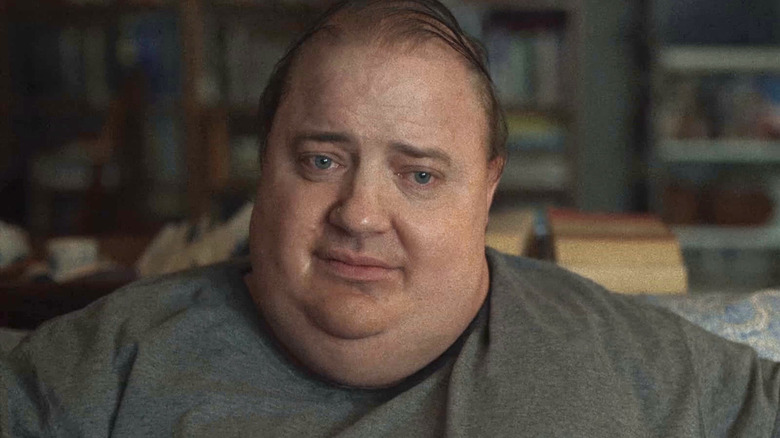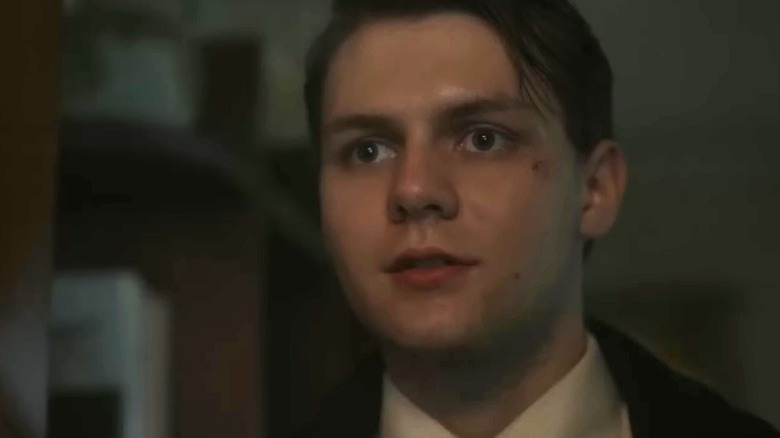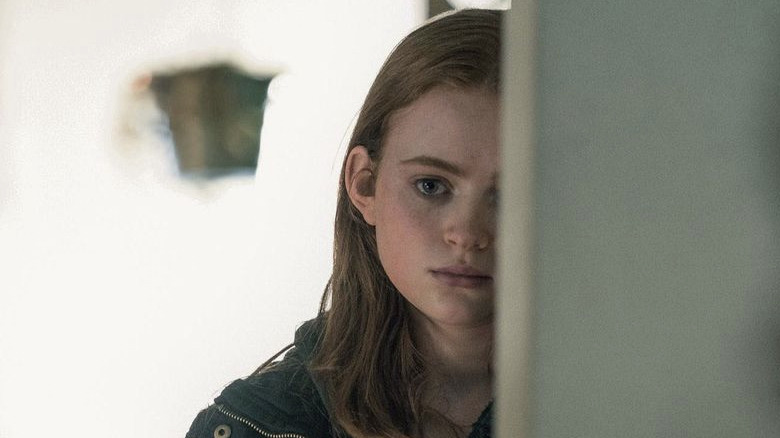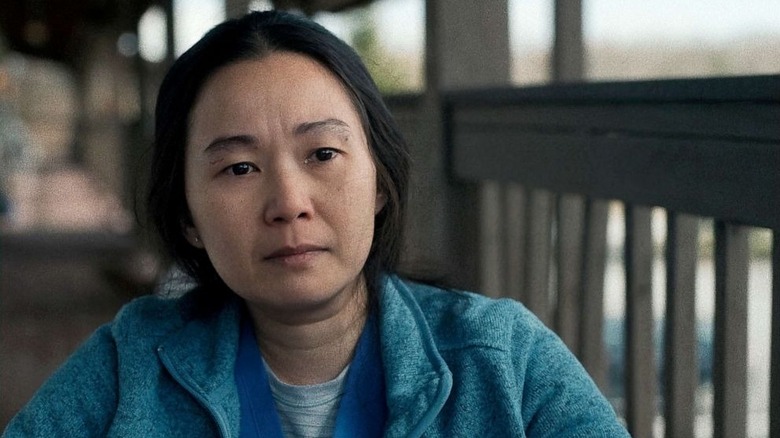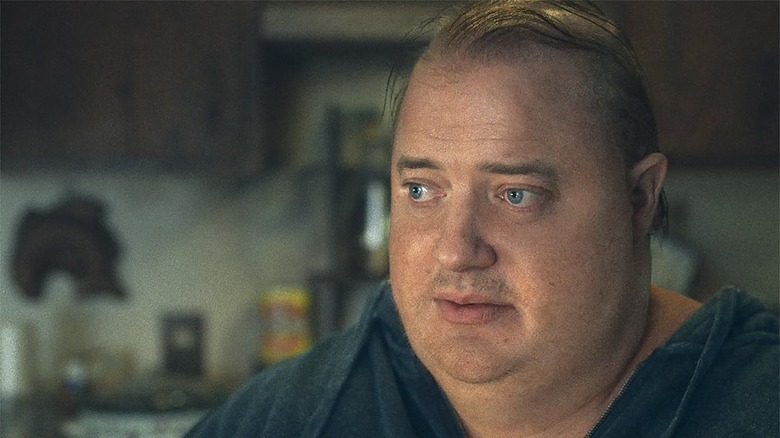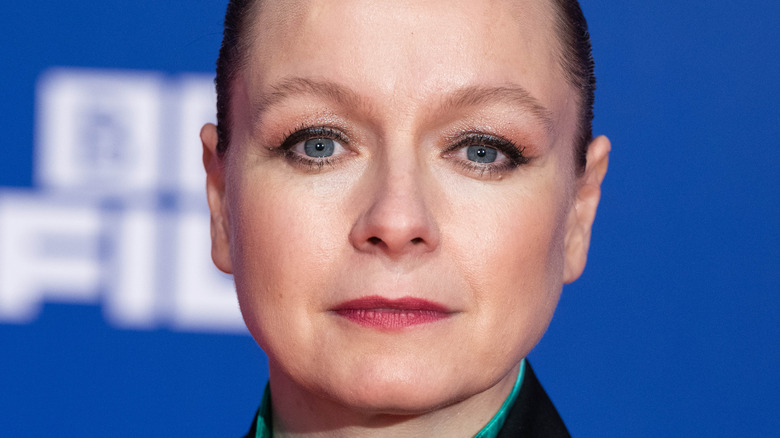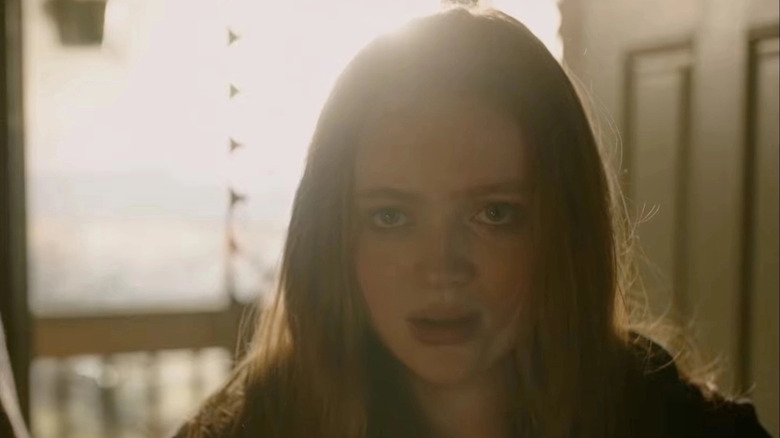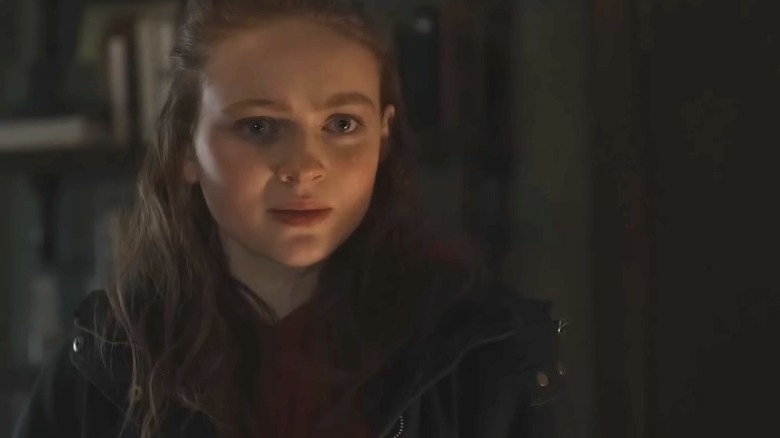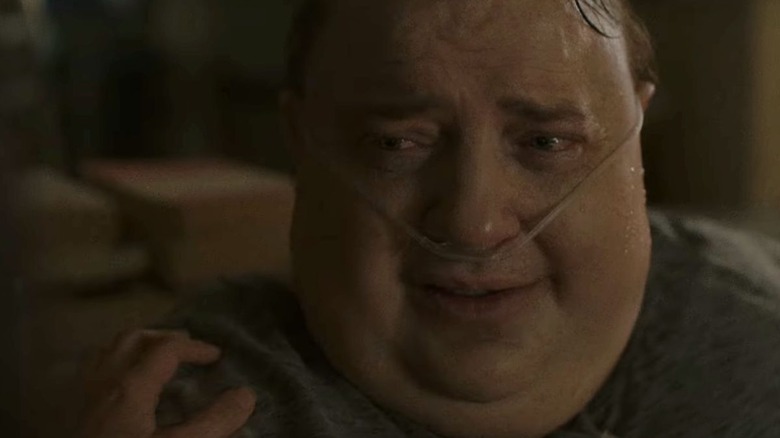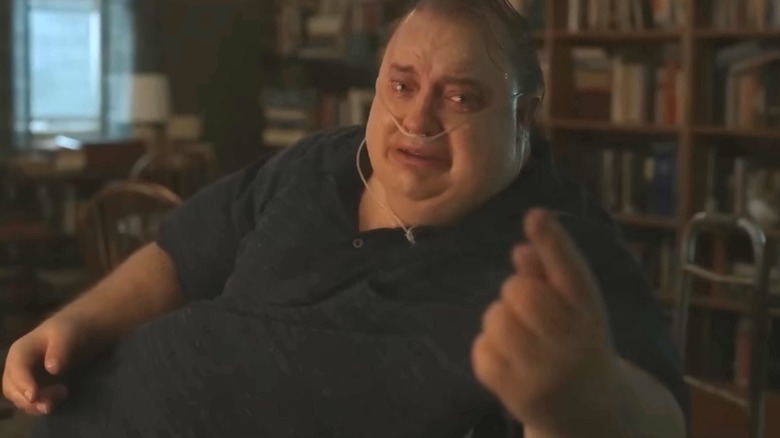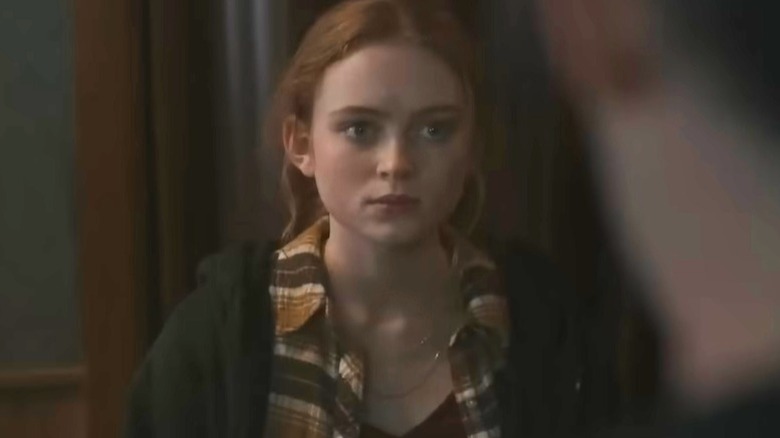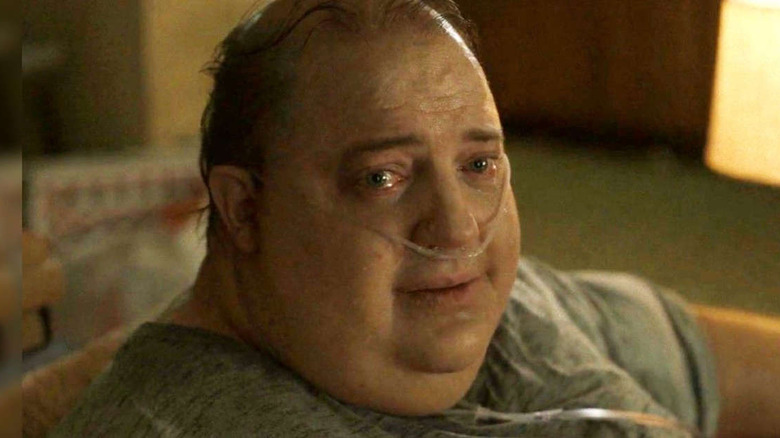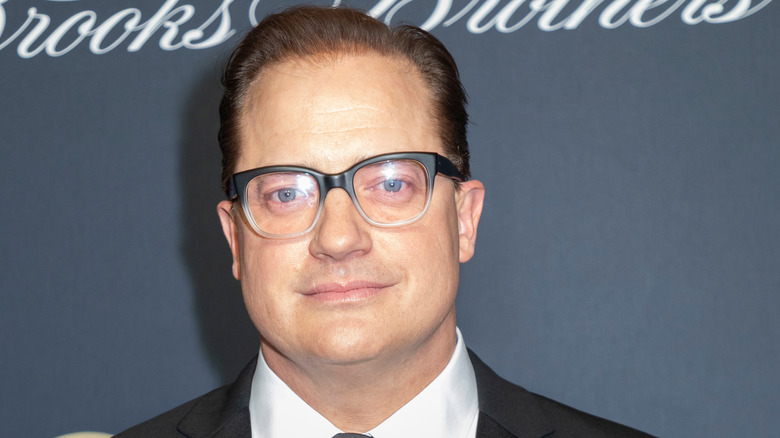The Ending Of The Whale Explained
Darren Aronofsky, the director of "Black Swan" and "Requiem for a Dream," returns with "The Whale," a new film that sees actor Brendan Fraser make the comeback performance of a lifetime in an emotional story of compassion. The film, based on the 2012 play of the same name, follows Charlie (Fraser), a reclusive 600-pound man looking to reconnect with his distant daughter, Ellie (Sadie Sink), while dealing with a resurgence of past mistakes. As Charlie, Fraser shows a range of emotions not seen in his past performances and leads a focused tale full of triumph and heartache.
From the realization of his worsening health to the constant conflicts stemming from Charlie's past mistakes bleeding into the present, "The Whale" has a strong emotional pull that carries through to its tear-jerking ending. There's nothing as cathartic as watching "The Whale's" final act, which sees Charlie confronting himself and making better efforts to reconnect with Ellie. There are also unexpected revelations, burning themes, and closing arcs that all come so suddenly that the impact of some things could've slipped by. Looper is here to clear things up and dissect everything that happened during "The Whale's" finale
The truth behind Thomas' visits
When we first meet Thomas (Ty Simpkins), we learn that he's a missionary who goes door to door spreading the word of the cult-like religious group he's a part of that believes the world is ending. While Charlie can accept him since he does help him at the start of the film, his nurse and friend, Liz (Hong Chau), outwardly criticizes Thomas, as both she and Charlie have a bad past with his group. However, Ellie is much more inquisitive about Thomas and is eventually able to get him to open up about himself, which leads to quite a revelation.
It turns out that Thomas actually isn't a part of that group at all. He's just a runaway who left his home because of his frustration with the religious practices of his church and stole money from them to finance his trip. This reveal makes sense since he constantly said he was "new" to the group and didn't know the name of Liz's father, who leads the group. This also adds to Thomas' belief that he's ordained by God to help Charlie since he became frustrated by his old church's ability to spread its word and sees Charlie as an opportunity for self-fulfillment. It's an unexpected reveal that makes Thomas less of an innocent follower.
Ellie's picture collection
From her first appearance, it's tough to get a read on Ellie because of how closed off she is, and you can't help but question her real intentions. One thing that stands out as strange is how she takes pictures of Charlie and Thomas at different points in the film. Ellie takes pictures of Charlie struggling to use his walker and Thomas when he's smoking weed. Although it just seems like nothing at first, Ellie uses these photos for disturbing projects.
Ellie uses the photo she takes of Charlie to ridicule him on social media, making fun of his weight and telling him to burn in hell. As for Thomas, she sends the photos of him smoking to his family after hearing his story, and it ultimately results in him reconnecting with his family. Although Ellie's photography might seem harmless at first, it has big implications for those in the photos, and it doesn't always yield positive results.
The loss of Charlie's lover
After the death of his lover, Alan, Charlie develops an eating disorder that leads him to become incredibly overweight and suffer dangerous health issues. Although Charlie is generally unwilling to talk about Alan's death, Liz finds a moment to talk to Thomas about it. Alan's death also impacted her because he was her brother. According to Liz, her father, who leads the religious group that Thomas is supposedly a part of, was very hard on Alan after he came back from a mission and decided to not engage in the arranged marriage that he set up for him.
Instead, Alan decided to pursue a relationship with Charlie, leading to his father kicking him out of the group and the family. However, Alan still couldn't shake the impact of his upbringing and spiraled into a bout of depression that ended in him taking his own life. This would have a devastating effect on both Charlie and Liz and explains why they're so close. Liz is shown to be protective of Charlie from the start, and the story of Alan's death establishes why. That Charlie, too, could soon die is likely a gut-wrenching feeling for Liz.
If you need help with an eating disorder or know someone who is, help is available. Visit the National Eating Disorders Association website or contact NEDA's Live Helpline at 1-800-931-2237. You can also receive 24/7 Crisis Support via text (send NEDA to 741-741).
If you or anyone you know is having suicidal thoughts, please call the National Suicide Prevention Lifeline by dialing 988 or by calling 1-800-273-TALK (8255).
Charlie's massive money
To get Ellie to spend more time with him, Charlie makes an offer that he'll pay her for the time she spends with him. It's a hefty amount. His offer of around $120,000 is unsurprisingly too good for Ellie to pass up, and it remains a big motivator for her throughout the film — along with Charlie rewriting her essays to help her graduate from school. However, given his conversations with Liz about not being able to afford better living conditions or a hospital visit, it's tough to believe that he has that money.
In a conversation with Mary (Samantha Morton), it is revealed that Charlie does have that money, and it leads to some other realizations and conflicts. Liz is frustrated by Charlie since he could've used that money to help himself and get the medical assistance he needs. Liz's belief that Charlie was broke played a role in some of the sacrifices she's made for him, leaving her feeling like she's been taken advantage of. However, Charlie would've likely never given up any of the money anyway since he always planned for Ellie to have it all.
A tumultuous reunion
It's no secret that Charlie's marriage to his ex-wife, Mary, ended in shambles. He left her and Ellie to pursue a relationship with Alan, leading Mary to cut ties with him completely. However, when Mary arrives at Charlie's after learning that Ellie is there, we get a clearer glimpse into their fractured relationship and Mary as a character. In their time alone for the first time in a long time, we see these two more open and honest than ever before, and it's a strong example of their complicated relationship.
Although the two end up fighting over what happened between them, Mary is shown to be much more compassionate than previously suggested. She not only shows sorrow for Charlie for his current condition but even tells him a story about helping Alan before he died. This doesn't mend their relationship, and Mary still leaves in a fury over these resurfaced feelings, yet this scene shows the genuine care that remains in their relationship and how Charlie's decision to leave still causes ripples in their family.
A secret room
About halfway through "The Whale," Charlie tries to retrieve a key sitting atop a closed door – only for it to fall into a place he can't reach. Luckily, he gets Thomas to grab the key for him, and he opens a room that looks untouched and pristine compared to the rest of his house. At first, it's tough to figure out what this spare bedroom exactly is, but it eventually becomes pretty clear.
Even before Thomas grabs a Bible with Alan's name on it from the room, it's obvious that this room is Charlie and Alan's old bedroom. After Alan's death, Charlie was unable to enter the room again and has never let anyone inside. He probably only unlocked it recently because Alan has been brought up in conversation again. He now sees it as solace as he heads towards a tragic end. There are no flashbacks that give us a real look at Charlie and Alan's relationship, but seeing Charlie's face when he looks into the room shows the real love he has for him still.
Charlie's final hope
Throughout "The Whale," Charlie is shown to be incredibly desperate in wanting to reconnect with Ellie. He's not only willing to pay a bunch of money to get her to keep him company but even offers to rewrite her essays to help her graduate. Even when Ellie is immensely cold towards Charlie, he still yearns for her love, and that makes you wonder what Charlie exactly wants from reconnecting with her.
However, when talking with Mary, Charlie opens up about his desire to reconnect with his daughter, saying that he simply wants her to have the best life possible to create a sense of redemption within himself. He simply sees helping Ellie as the last thing he can do before dying to leave things on a better note and feel like he did something right. It's the wish that any parent would have for their child, and Charlie doesn't want Ellie to feel like she can't accomplish things because of how their family has fractured.
Charlie's sense of positivity
Even when the worst things are happening to him, Charlie generally has a positive outlook on life and those around him. When Thomas is chastised by Liz or Ellie does something that even her mother views as evil, Charlie always shows compassion to those around him. For Charlie, though, this positivity is both a gift and a curse. While it is nice that he tries to find the good in things, it can lead to him ignoring real problems in his life and not being able to confront things.
For instance, while it's nice that he makes an effort to remind Ellie that he thinks she's amazing, it doesn't heal the hurt she's suffered from their estrangement. This overt sense of positivity is also what leads to Charlie losing his faith and desiring to see only harsh truths that make "The Whale's" final act really tear at your heart. However, even when Charlie hits his lowest point, he is able to find the good in things again, leading to an emotional final sequence between him and Ellie. Charlie's journey throughout "The Whale" is about finding and understanding the truth about yourself without losing that sense of compassion that makes us care for one another as well as ourselves.
A final revelation
As shown in the opening shots, Charlie keeps his webcam off when talking to his class because he doesn't want them to see what he looks like. However, after sending them an assignment that asks them to simply be honest, Charlie makes the bold choice to turn his camera on for the first time. With the assignment (or more so the wording of it) getting Charlie fired from his position and his students' submissions inspiring him, he decides to show them who their professor really is.
In most other movies, this would be played like a truly inspirational moment. Yet, with Darren Aronofsky helming, it feels like a dark slice of reality, as some of Charlie's students can be seen reacting in shock around his square in the chatroom. It's a gut-wrenching affirmation of the truth that Charlie has been trying to hide from for quite some time, and the way it ends, with him throwing his laptop across the room, is legitimately painful. It's a moment you knew was coming, but still feels like a brutal punch to the gut.
The essay's author
When we're first introduced to Thomas, as he helps Charlie during a painful incident of heart failure, we also learn about an essay on "Moby Dick" that Charlie loves. For most of the film, we're left unsure who the author of this essay is. We just know that it acts as sort of a calming mantra for Charlie that reminds him of something he loves. In the final moments of "The Whale," we discover that Ellie is the author of the essay and that it's been a pivotal part of Charlie's connection to her.
Any time Charlie is in pain or on the verge of death, he either repeats part of the essay to himself or gets someone to read it to him. With the knowledge that Ellie is the author, hearing her essay acts as a reminder for Charlie of his final wish to make sure that she is in a good place before dies. It's a reveal that kicks off a deeply emotional final sequence between Charlie and Ellie that is undoubtedly one of the most emotionally charged moments in the film.
Charlie and Ellie's final reckoning
The final moments of "The Whale" are full of rich emotion – largely because of the final reckoning that Charlie and Ellie have before Charlie succumbs to his poor health. Although it seems like Ellie will rush out the door before she and her father can have one last moment together, she stops and fulfills Charlie's request to hear her read her essay. This moment also leads to Charlie getting up to walk towards Ellie, something she requests he does earlier in the film. It's a climactic, full-circle moment bursting with emotion.
There's something truly powerful about watching Charlie find the strength to get up and walk on his own in those final moments. However, this last act of strength doesn't mean that Charlie avoids death, as he's drawn up into a heavenly light. Darren Aronofsky ends the film on a fantastical vision of Charlie on the beach with Mary and Ellie. The choice to end the film on this flashback to a beloved memory likely signifies Charlie is at peace with how he left things and acts as a harmonious and fulfilling ending to his journey. Although Charlie and Ellie's relationship has been complicated, it's legitimately compelling to watch them come together in this final moment.
Is this the start of Brendan Fraser's comeback?
Although Brendan Fraser was once a notable mainstream star leading franchises like "The Mummy," it's no secret that his career has taken a downturn as he's dealt with personal issues and opened up more about being sexually assaulted. Recently, Fraser has started to work more in front of the camera again with his role as Cliff Steele/Robotman in "Doom Patrol" and appearances in films such as "No Sudden Move" and "Line of Descent." He was even set to appear in DC's now-canceled "Batgirl" movie as the villain Firefly. With all the acclaim he's receiving for his performance in "The Whale," does this role signal a true comeback for Fraser? Absolutely.
Fraser is set to be one of this year's top awards contenders and has already received a best actor nomination at the upcoming Golden Globes with many more likely to come. Ever since he got some big social media buzz for the lengthy standing ovation he received at "The Whale's" premiere at the Venice Film Festival, it seems that audiences have rallied around him. Fraser's performance in "The Whale" and the acclaim he continues to receive for it could easily lead up to a strong resurgence for the actor that fans would be thrilled to see. Who knows? Maybe "The Mummy" franchise could return with him.
If you or anyone you know has been a victim of sexual assault, help is available. Visit the Rape, Abuse & Incest National Network website or contact RAINN's National Helpline at 1-800-656-HOPE (4673).
